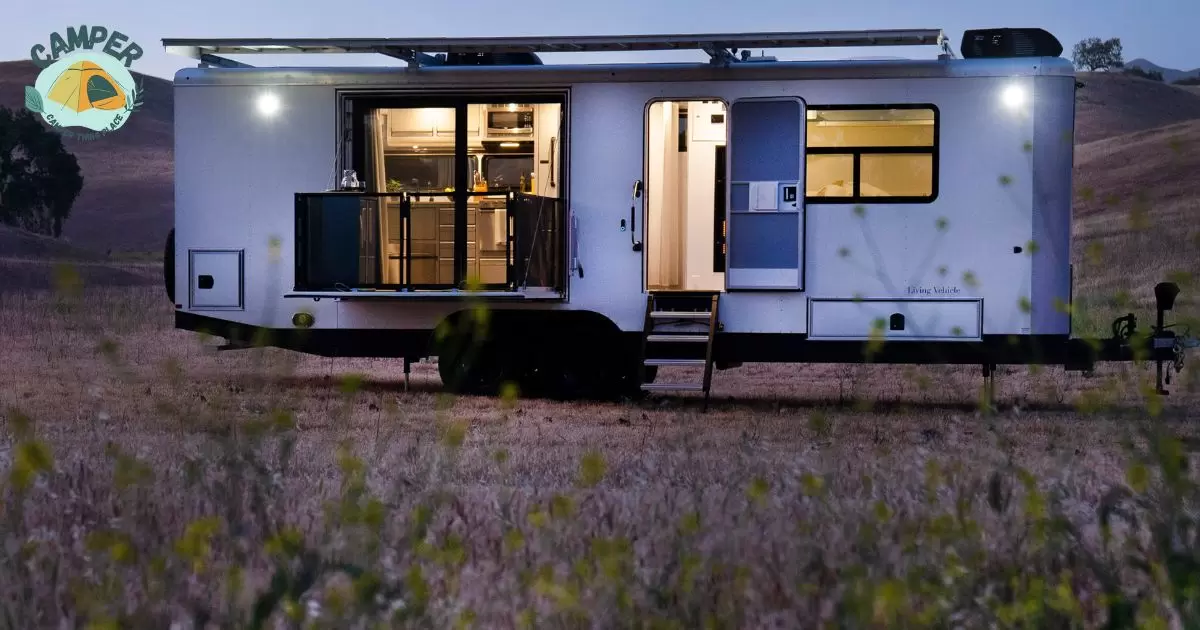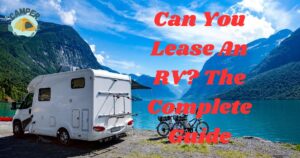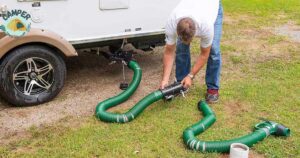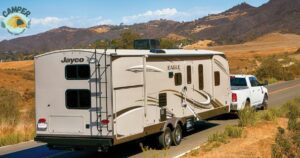Florida Counties are regions within the state of Florida, each with its own local government. There are 67 counties in Florida, ranging from populous urban areas to serene rural landscapes. These counties play a crucial role in managing local affairs and services for residents.
Imagine waking up surrounded by nature, enjoying breakfast beneath the trees, and returning to your RV after a day of hiking. Expecting the risk of improper parking, the question arises: which Florida counties genuinely allow RV living? So here are some counties in Florida that allow RV living Brevard, Citrus, Charlotte, DeSoto, Collier, Marion, Lee, Polk County, Orange County, Palm Beach, Seminole County, and Miami-Dade.
Navigating RV life isn’t just about plugging into a power outlet, especially when you have kids on board. Meeting legal obligations and adhering to HOA regulations adds complexity. Fortunately, the rules aren’t overly stringent, allowing you at least one night of parking flexibility.
Can You Live In An RV In Florida?
Absolutely! Living in an RV in Florida is not only possible but also increasingly popular. Many Florida counties, including Brevard, Citrus, Charlotte, DeSoto, Collier, Marion, Lee, Polk County, Orange County, Palm Beach, Seminole County, and Miami-Dade, allow RV parking.
While enjoying the flexibility of RV living, it’s essential to navigate legal obligations and HOA regulations. Fortunately, Florida’s regulations are often lenient, providing RV enthusiasts the opportunity to embrace a mobile lifestyle.
Research The Rules & Regulations
Before embarking on RV living in Florida, it’s crucial to research the rules and regulations. Understanding the legal requirements in different counties, such as Brevard, Citrus, Charlotte, DeSoto, Collier, Marion, Lee, Polk County, Orange County, Palm Beach, Seminole County, and Miami-Dade, is essential. This ensures a smooth and compliant RV experience, allowing you to enjoy the freedom of the road without unexpected setbacks.
Be Aware Of Weather & Humidity
Living in an RV in Florida comes with the perk of sunny days, but it’s vital to be aware of the weather and humidity. Florida’s climate can be hot and humid, especially during certain seasons.
Proper preparation, such as investing in good ventilation and climate control, will make your RV living experience more comfortable. Stay informed about weather patterns to ensure you’re ready for any changes and can fully enjoy your time in the Sunshine State.
Have A Plan For Where To Park Your RV
When living in an RV in Florida, having a plan for where to park is crucial, especially when considering the unique requirements of a smallest drivable RV. Explore RV-friendly parks, campgrounds, and designated parking areas in counties.
Researching and securing suitable parking spots in advance ensures a hassle-free experience, allowing you to focus on enjoying your RV lifestyle without unexpected challenges.
Be Prepared For The Cost Of Living
Living in Florida in an RV can be awesome, but be ready for costs. RV parks may charge for space and utilities. Check prices and plan your budget.
Some places could cost more, but it depends on the facilities. Remember, living mobile still has expenses. Prepare and enjoy the sunny journey.
Have A Plan For Your Time
Planning your time is crucial, especially when living in an RV in Florida. With endless adventures awaiting, having a schedule helps you make the most of your days. Consider exploring beaches, parks, and cultural spots.
Allocate time for work, if needed, and embrace the flexibility of RV life. A well-thought-out plan ensures you don’t miss out on the Sunshine State’s wonders. Stay organized, and let every moment in Florida be a part of your exciting journey.
Florida Counties That Allow RV Living
Florida offers numerous counties where RV living is permitted, each with its unique set of rules and regulations. Highlighted below are some of the most sought-after counties for those embracing the RV lifestyle.
Lake County
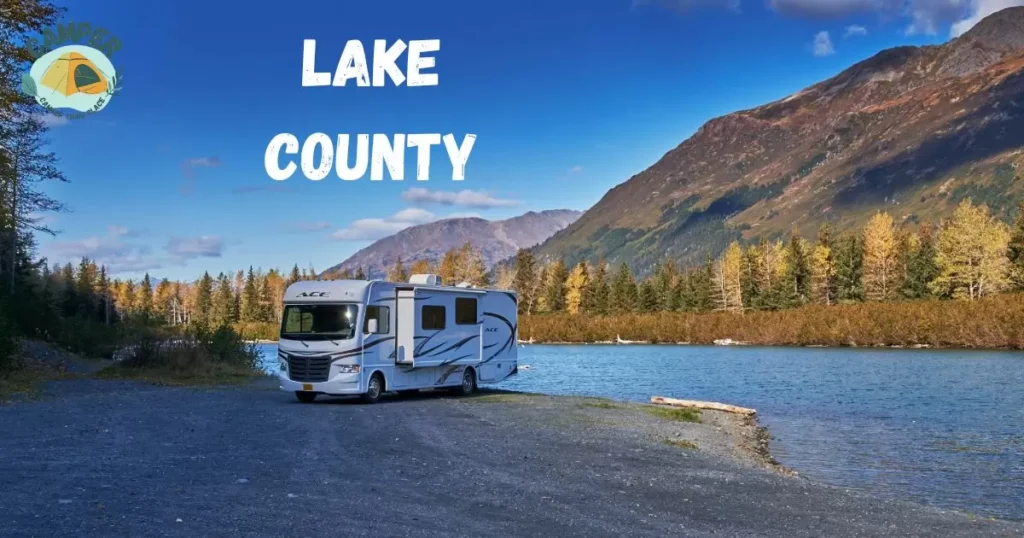
Lake County in Florida offers a welcoming environment for those looking to live in an RV. Here are some key points about RV living in Lake County:
RV Parks Abound
- Lake County boasts numerous RV parks catering to long-term residents.
- Explore options with various amenities, from basic facilities to more upscale offerings.
Zoning Considerations
- Check local zoning regulations for specific areas within Lake County.
- Certain zones may be more accommodating to extended RV stays, providing a comfortable living experience.
Natural Beauty and Recreation
- Lake County is known for its scenic landscapes, including lakes and parks.
- Take advantage of outdoor recreation opportunities, such as hiking, fishing, and boating.
Community Atmosphere
- Many RV parks in Lake County foster a sense of community.
- Social events and gatherings create a friendly atmosphere for residents.
Cost of Living
- Research the cost of living in RV parks within Lake County.
- Consider factors like space rent, utilities, and additional amenities offered.
Proximity to Orlando
- Lake County’s location provides relatively easy access to the attractions of Orlando.
- Enjoy the best of both worlds – the tranquility of RV living and the excitement of nearby urban centers.
Before making Lake County your RV home, it’s advisable to inquire directly with RV parks and local authorities for the latest information on regulations and available amenities.
This ensures a smooth and enjoyable experience as you embrace the RV lifestyle in Lake County, Florida. Safe travels and happy adventures.
Polk County
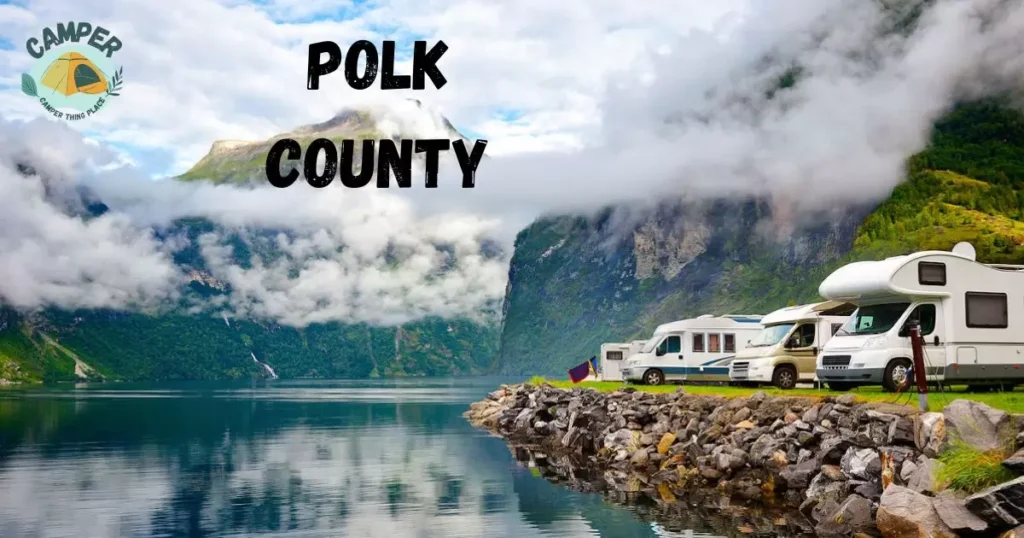
Polk County, Florida, offers a diverse landscape and various options for those considering RV living. Here’s what you need to know:
- Rural Opportunities
- Polk County has rural areas that may be more accommodating for RV living.
- Explore the outskirts for a more relaxed and flexible lifestyle.
- Check Zoning Rules:
- Different areas within Polk County may have specific zoning regulations.
- Before settling, check with local authorities to ensure compliance with zoning rules for extended RV stays.
- RV Parks and Campgrounds:
- Discover RV parks and campgrounds in Polk County catering to long-term residents.
- Some parks offer various amenities, making them suitable for extended stays.
- Community Feel:
- Certain RV parks in Polk County foster a sense of community.
- Social activities and events may provide opportunities to connect with fellow RV enthusiasts.
- Explore Nature:
- Polk County features natural attractions, including parks, lakes, and trails.
- Embrace the outdoor lifestyle with hiking, fishing, and other recreational activities.
- Cost Considerations:
- Research the cost of living in RV parks within Polk County.
- Factor in space rent, utilities, and any additional amenities offered by the parks.
- Proximity to Central Florida:
- Polk County’s central location provides accessibility to various attractions in Central Florida.
- Enjoy the convenience of exploring nearby cities and cultural hotspots.
Before making Polk County your RV home, verify the latest information on zoning regulations and available amenities directly with RV parks and local authorities.
This ensures a smooth transition into the RV lifestyle, allowing you to fully enjoy the diverse offerings of Polk County, Florida. Happy travels and adventure await.
Lee County
Lee County in Florida is a fantastic destination for those looking to embrace the RV lifestyle. Here’s what you need to know about RV living in Lee County:
- RV Resorts and Parks:
- Lee County offers numerous RV resorts and parks catering to extended stays.
- Explore options that suit your preferences, from basic facilities to more upscale amenities.
- Proximity to Beaches:
- Enjoy coastal living in proximity to beautiful beaches along the Gulf of Mexico.
- RV parks in Lee County often provide easy access to the sandy shores and warm waters.
- Community Living:
- Some RV parks in Lee County foster a sense of community.
- Social events and gatherings create a friendly atmosphere for residents to connect.
- Outdoor Recreation:
- Take advantage of outdoor recreational opportunities, including hiking, biking, and water activities.
- Lee County’s natural beauty offers a picturesque backdrop for your RV adventures.
- Diverse Amenities:
- Explore RV parks that provide diverse amenities such as swimming pools, fitness centers, and social spaces.
- Choose a location that aligns with your preferences and lifestyle.
- Cost of Living:
- Research the cost of living in RV parks within Lee County.
- Consider factors like space rent, utilities, and any additional services offered by the parks.
- Exploring Fort Myers:
- Fort Myers, located in Lee County, offers cultural attractions, shopping, and dining experiences.
- Enjoy the convenience of urban amenities while still relishing the RV lifestyle.
Before making Lee County your RV home, check with local authorities and RV parks for the latest information on regulations and amenities.
This ensures a smooth transition into the RV lifestyle, allowing you to fully enjoy the sun-soaked experiences that Lee County, Florida, has to offer. Safe travels and happy adventures.
Collier County
Collier County, situated in Southwest Florida, provides a unique and attractive setting for those considering RV living. Here are key points about RV living in Collier County:
- Luxurious RV Living:
- Collier County offers upscale RV resorts, providing a comfortable and luxurious living experience.
- Explore parks that offer a range of amenities, including pools, spas, and recreational facilities.
- Proximity to Gulf Coast:
- Enjoy the proximity to the stunning Gulf of Mexico beaches.
- Collier County’s RV parks often provide convenient access to white sandy shores and crystal-clear waters.
- Amenities Galore:
- Discover RV parks that go beyond the basics, offering a wide array of amenities for residents.
- Consider the facilities that align with your preferences for a fulfilling stay.
- Natural Beauty:
- Immerse yourself in the natural beauty of Collier County, with parks and preserves showcasing the region’s unique flora and fauna.
- Explore hiking trails, birdwatching, and other outdoor activities.
- Cost Considerations:
- Research the cost of living in Collier County’s RV parks.
- Evaluate space rent, utility expenses, and any additional services included in the overall cost.
- Cultural Experiences in Naples:
- Naples, located in Collier County, offers cultural attractions, upscale shopping, and a vibrant dining scene.
- Enjoy the sophistication of urban life while savoring the freedom of RV living.
- Community Atmosphere:
- Some RV parks in Collier County foster a sense of community through organized events and social gatherings.
- Connect with fellow RV enthusiasts and make the most of the community spirit.
Before finalizing your RV plans in Collier County, check with local authorities and RV parks for the latest information on regulations and amenities.
This ensures a seamless transition into the RV lifestyle, allowing you to relish the luxury, natural beauty, and cultural experiences that Collier County, Florida, has to offer. Safe travels and happy adventures.
Broward County
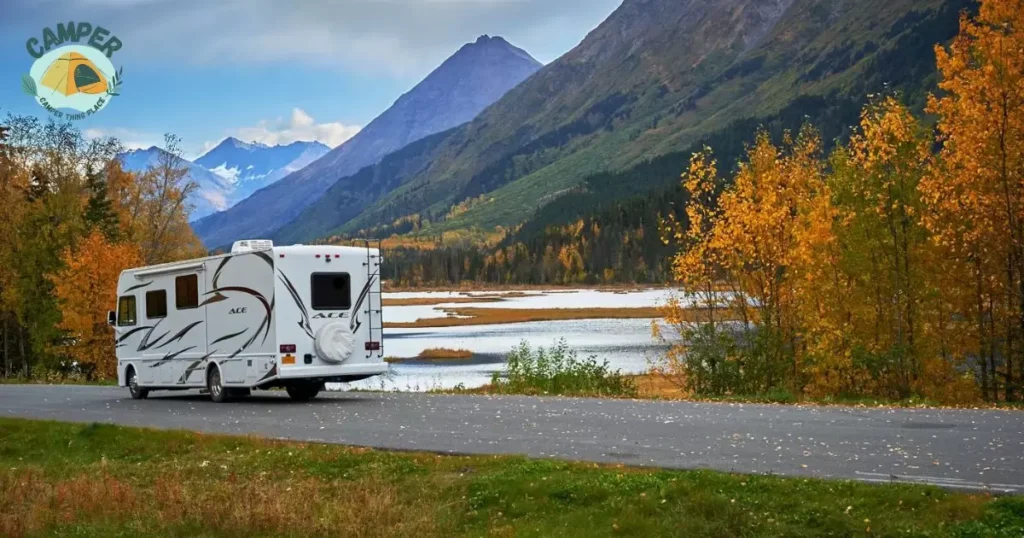
While Broward County, located in Southeast Florida, is more urbanized compared to some other counties, there are still considerations for those interested in RV living. Here’s what you need to know:
- Limited RV Parks:
- Broward County may have limited options for RV parks compared to more rural areas.
- Research and identify RV-friendly parks that accommodate extended stays.
- Zoning Regulations:
- Due to the urban setting, check zoning regulations and local ordinances related to RV living.
- Some areas may have restrictions, so it’s essential to be aware of and adhere to these rules.
- Accessibility to Urban Amenities:
- Broward County offers easy access to urban amenities, including shopping, dining, and cultural attractions.
- Consider the convenience of being close to diverse entertainment options.
- Consider Nearby Counties:
- If RV parks in Broward County are limited, explore neighboring counties like Palm Beach or Miami-Dade for additional options.
- Nearby areas may provide a mix of urban and suburban RV living experiences.
- Cost of Living:
- Determine the cost of living in RV parks within Broward County.
- Understand space rent, utility costs, and any additional fees associated with the chosen location.
- Proximity to Beaches:
- While Broward County may be more urban, it still offers proximity to beautiful beaches along the Atlantic Ocean.
- Explore RV parks with convenient access to coastal areas for relaxation and recreation.
- Community Lifestyle:
- Some RV parks in urban areas foster a sense of community through organized events and shared spaces.
- Connect with other RV enthusiasts and enjoy a social atmosphere.
Before deciding on Broward County for RV living, confirm current regulations, explore RV parks, and consider the urban lifestyle it provides.
Be mindful of zoning rules and community guidelines to ensure a positive and compliant RV experience in this vibrant South Florida county. Safe travels and happy adventures.
Palm Beach County
While Palm Beach County in Florida is known for its affluent lifestyle, it also offers opportunities for RV living. Here’s what you need to know:
- RV Parks and Campgrounds:
- Explore RV parks and campgrounds in Palm Beach County that accommodate extended stays.
- Look for options with varying amenities, from basic facilities to more comprehensive services.
- Zoning Regulations:
- Check local zoning regulations in different areas of Palm Beach County.
- Some zones may have restrictions, so it’s important to ensure compliance with regulations.
- Diverse Recreational Options:
- Palm Beach County provides diverse recreational opportunities, including parks, golf courses, and water activities.
- Take advantage of the beautiful weather and engage in outdoor adventures.
- Cultural and Urban Attractions:
- Explore cultural attractions, upscale shopping, and dining experiences in Palm Beach County.
- While enjoying the RV lifestyle, take time to discover the sophistication of the urban scene.
- Cost of Living:
- Research the cost of living in RV parks within Palm Beach County.
- Evaluate space rent, utility expenses, and any additional amenities provided by the parks.
- Community Engagement:
- Some RV parks foster a sense of community through social events and gatherings.
- Connect with fellow RV enthusiasts and enjoy the camaraderie.
- Proximity to Coastal Beauty:
- Palm Beach County’s location offers proximity to the stunning Atlantic Ocean.
- Enjoy the coastal beauty, relax on the beaches, and embrace the laid-back lifestyle.
Before making Palm Beach County your RV home, verify the latest information on zoning regulations, amenities, and costs with local authorities and RV parks.
This ensures a smooth transition into the RV lifestyle, allowing you to appreciate both the sophistication of Palm Beach County and the freedom of RV living. Safe travels and happy adventures.
HOA RV Parking Rules
Homeowners Associations (HOAs) often have specific rules and regulations regarding RV parking to maintain a cohesive and aesthetically pleasing community. While these rules can vary, here are common HOA RV parking guidelines:
Designated Parking Areas
- HOAs may designate specific areas within the community for RV parking.
- Residents with RVs are usually required to use these designated spaces to avoid clutter.
Time Restrictions
- HOAs often impose time restrictions on how long an RV can be parked in a designated area.
- Temporary parking for loading and unloading is usually allowed, but long-term parking may be restricted.
Screening and Covers
- Some HOAs require RVs to be screened or covered when parked.
- This could involve using landscaping, fences, or covers to shield the RV from view.
Size and Type Restrictions
- HOAs may have restrictions on the size and type of RVs allowed.
- Larger RVs or those with distinctive features might have additional guidelines.
Aesthetic Guidelines
- HOAs often enforce rules to maintain a visually appealing neighborhood.
- RVs must adhere to aesthetic standards to blend with the overall look of the community.
Registration and Approval
- Residents may need to register their RV with the HOA.
- Approval may be required before parking an RV in the community.
Storage Facilities
- Some HOAs may encourage or require residents with RVs to use off-site storage facilities.
- This keeps RVs out of the community when not in use.
Consequences for Non-Compliance
- HOAs typically outline consequences for residents who violate RV parking rules.
- Penalties may include fines, towing, or other disciplinary actions.
Residents need to familiarize themselves with the specific RV parking rules outlined in their HOA’s governing documents.
Clear communication with the HOA and adherence to the guidelines help maintain harmony within the community. Residents should also stay updated on any changes to the rules and promptly address any concerns or inquiries with the HOA board.
Can I Live in an RV With My Kids?
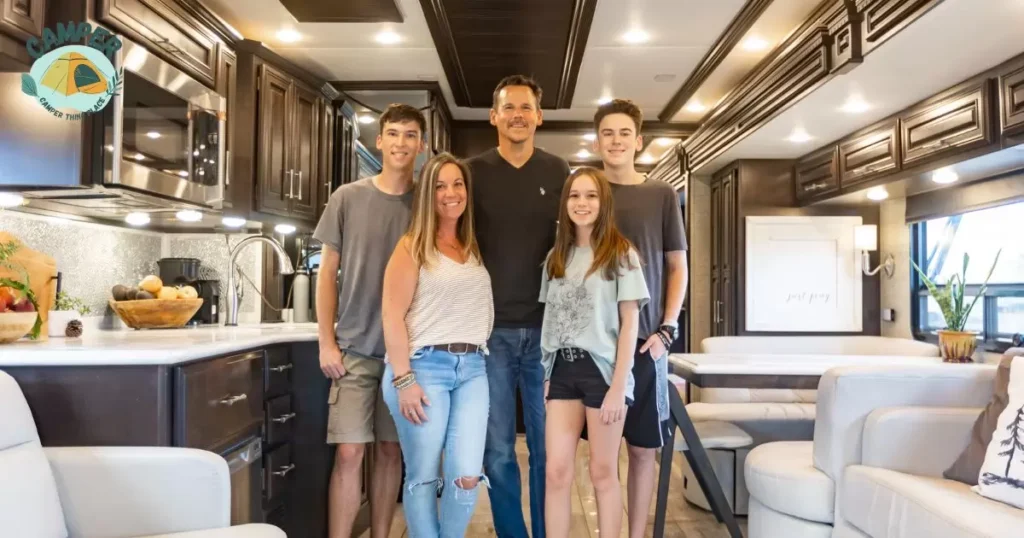
Living in an RV with your kids can be an exciting adventure! Many families choose this lifestyle for a closer bond and to explore new places together. Check local laws about RV living with kids, and find RV parks that welcome families.
Look for parks with play areas and kid-friendly activities. Plan for homeschooling or remote learning if your kids are in school. Make sure the RV has enough space for everyone.
Living on the road can teach your kids about different cultures and nature. It’s a unique way to create lasting family memories while enjoying the freedom of the open road.
How Does RV Living In Florida Work?
Living in an RV in Florida is a popular choice, and here’s how it works. First, find RV parks that allow long-term stays; some even offer special amenities like pools and community events.
Check local zoning rules to make sure you can stay in your chosen area. Florida’s mild weather makes it great for year-round RV living, but be ready for the occasional tropical storm.
Plan your budget, considering costs like space rent, utilities, and any extra amenities. Explore the beautiful beaches, theme parks, and natural spots around Florida while enjoying the flexibility of RV living.
Remember, every county in Florida might have different rules, so it’s important to research and follow the regulations. Living in an RV in Florida is not just a home; it’s a lifestyle full of adventures and sunshine.
Frequently Asked Questions
Can an RV be a primary residence in Florida?
Yes, an RV can be a primary residence in Florida if it complies with local zoning laws and regulations.
Is Florida RV-friendly?
Yes, Florida is generally RV-friendly with numerous campgrounds and RV parks throughout the state.
How much does it cost to live in an RV park in Florida?
RV park costs in Florida vary, but on average, you can expect to pay between $30 to $100 per night or around $500 to $1,500 per month, depending on the location, facilities, and the length of your stay.
Is it illegal to live in an RV full-time in Florida?
Living in an RV full-time in Florida is generally legal, but it depends on local zoning laws and regulations. It’s important to ensure compliance with specific rules in the area where you plan to reside.
Are RVs taxed in Florida?
RVs in Florida are generally not subject to specific state income taxes, but vehicle registration fees may apply.
Final Thoughts
In exploring RV living across Florida, it’s essential to answer a crucial question which Florida counties genuinely allow RV living? Each county, from the serene landscapes of Lake County to the coastal charm of Lee and Collier Counties, presents unique opportunities.
While urban Broward County may have limited options, neighboring counties provide a mix of urban and suburban RV experiences. Remember to check local regulations, explore amenities, and embrace the unique lifestyle each county offers.
So, whether you seek rural tranquility, beachside bliss, or urban convenience, Florida’s counties invite you to embark on an exciting RV adventure. Safe travels and happy living.

Jackson Ray, a seasoned blogger with a decade of experience, is the creative mind behind “camperthingsplace.com.” Explore his wealth of insights and passion for camping through engaging content on the website.
